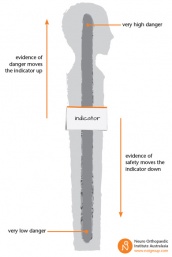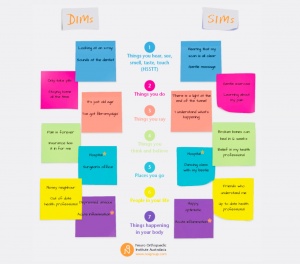The Protectometer: Difference between revisions
Bridget Ward (talk | contribs) mNo edit summary |
Bridget Ward (talk | contribs) mNo edit summary |
||
| Line 7: | Line 7: | ||
The Protectometer is a tool developed by Lorrimer Moseley and David Butler for use by clinicians and patients in helping to understand what causes an individuals’ experience of pain (Refs) | The Protectometer is a tool developed by Lorrimer Moseley and David Butler for use by clinicians and patients in helping to understand what causes an individuals’ experience of pain (Refs) | ||
It is one of the tools used in the Explain Pain approach to pain management. This approach uses as number of educational interventions to help pts and clinicians manage pain (Refs) | It is one of the tools used in the Explain Pain (EP) approach to pain management. This approach uses as number of educational interventions to help pts and clinicians manage pain (Refs) | ||
[[File:Protectometer-introduction.jpg|thumb|257x257px]] | [[File:Protectometer-introduction.jpg|thumb|257x257px]] | ||
| Line 15: | Line 15: | ||
DIMs- are things that the brain might see as credible evidence of ‘Danger In Me’’. They may be things we hear, see, touch, taste; things we do; things we think and believe; places we go; people in our life; and things happening in our body (Ref) | DIMs- are things that the brain might see as credible evidence of ‘Danger In Me’’. They may be things we hear, see, touch, taste; things we do; things we think and believe; places we go; people in our life; and things happening in our body (Ref) | ||
SIMs - are things the brain might see as credible evidence of ‘Safety in Me’. They may be in the same categories as the above (Ref) | SIMs - are things the brain might see as credible evidence of ‘Safety in Me’. They may be in the same categories as the above (Ref) | ||
Moseley and Butler propose that | |||
You will have pain when your brain concludes that there is more credible evidence of danger in me than there is credible evidence of safety in me (Cite, Ref) | |||
[[File:Dims and Sims.jpg|thumb]] | [[File:Dims and Sims.jpg|thumb]] | ||
| Line 22: | Line 26: | ||
== How does this relate to pathophysiology? == | == How does this relate to pathophysiology? == | ||
DIMs and | DIMs and SIMs are hypothesised by Moseley and Butler to be represented by neurotags in the brain. That is ..... (Ref] | ||
These can be modified and changed, to change the perception of pain, by using the EP approach (Ref) | |||
== What’s the evidence? == | == What’s the evidence? == | ||
There is growing evidence of | There is growing evidence that the EP approach, which includes the use of The Protectometer and the concepts of DIMS and SIMs is effective in reducing pain and disability (Refs). This may be when used alone, or as part of a multimodal treatment approach (Ref) | ||
== References == | == References == | ||
<references /> | <references /> | ||
Revision as of 07:56, 10 March 2018
Original Editor - Bridget Ward (VOC- work in progress)
What’s the Protectometer[edit | edit source]
The Protectometer is a tool developed by Lorrimer Moseley and David Butler for use by clinicians and patients in helping to understand what causes an individuals’ experience of pain (Refs)
It is one of the tools used in the Explain Pain (EP) approach to pain management. This approach uses as number of educational interventions to help pts and clinicians manage pain (Refs)
The Protectometer uses the concepts of DIMs (‘Danger in Me’) and SIMs (‘Safety in Me’) to help understand why we experience pain (Refs)
What are DIMs and SIMs?[edit | edit source]
DIMs- are things that the brain might see as credible evidence of ‘Danger In Me’’. They may be things we hear, see, touch, taste; things we do; things we think and believe; places we go; people in our life; and things happening in our body (Ref)
SIMs - are things the brain might see as credible evidence of ‘Safety in Me’. They may be in the same categories as the above (Ref)
Moseley and Butler propose that
You will have pain when your brain concludes that there is more credible evidence of danger in me than there is credible evidence of safety in me (Cite, Ref)
How does this relate to pathophysiology?[edit | edit source]
DIMs and SIMs are hypothesised by Moseley and Butler to be represented by neurotags in the brain. That is ..... (Ref]
These can be modified and changed, to change the perception of pain, by using the EP approach (Ref)
What’s the evidence?[edit | edit source]
There is growing evidence that the EP approach, which includes the use of The Protectometer and the concepts of DIMS and SIMs is effective in reducing pain and disability (Refs). This may be when used alone, or as part of a multimodal treatment approach (Ref)








